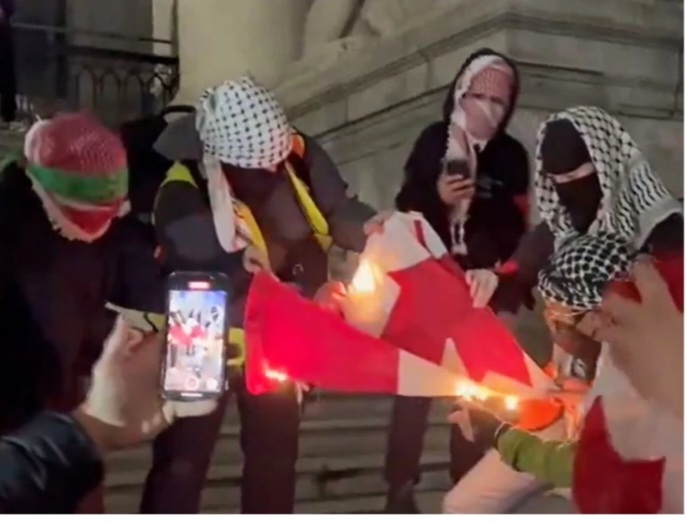Why do some protests receive harsh crackdowns while others seem to face minimal consequences? Recent events in Canada have brought this question into sharp focus. On October 7, 2024, a pro-Palestinian rally in Vancouver saw demonstrators burning Canadian flags and chanting “death to Canada,” prompting widespread condemnation. The incident invites comparison with the Freedom Convoy protests of 2022, where peaceful demonstrators waving Canadian flags faced severe financial and legal penalties. Are we witnessing a double standard in the government’s approach to dissent, or do these protests present fundamentally different challenges?
Why is it that one group of flag-waving protesters faced financial sanctions and arrests, while another engaged in flag burning with less immediate consequences? Are some forms of protest treated as more acceptable than others?
A Heated Rally in Vancouver
The Vancouver rally was organized by the Samidoun Palestinian Prisoner Solidarity Network to mark the anniversary of the 2023 Hamas attack on Israel. The protest, marked by incendiary rhetoric and the burning of Canadian flags, was widely condemned across political lines. Prime Minister Justin Trudeau and Vancouver Mayor Ken Sim both called the actions “unacceptable,” with Trudeau stressing that “hate speech and acts of violence have no place in Canada.”
Vancouver Police have launched an investigation to determine whether the actions at the rally constitute criminal offenses. Some community leaders have also voiced concern that the display could inflame racial tensions and undermine the cause of peaceful protest.
Freedom Convoy: A Different Story
In contrast, the Freedom Convoy of early 2022 was met with a much harsher response. The convoy, sparked by COVID-19 vaccine mandates and lockdown measures, saw truckers and their supporters converge in Ottawa, effectively paralyzing the downtown area and blocking key border crossings. The federal government invoked the Emergencies Act for the first time in Canadian history, granting extraordinary powers to law enforcement, including the ability to freeze the bank accounts of protesters without a court order. Over 200 accounts were frozen, affecting nearly $8 million in assets, and numerous arrests were made. A federal judge later found this action to be an overreach, ruling it unconstitutional and a violation of the Charter of Rights and Freedoms.
The stark contrast in government response raises questions about the standards used to determine which protests warrant extraordinary measures. Is it the nature of the grievances, the composition of the protesters, or the public reaction that dictates these responses?
A Question of Double Standards?
For many, the divergent treatment of these two protests brings to light a perceived double standard in Canada’s approach to dissent. Some politicians, like Conservative MP Pierre Poilievre, argue that the swift and severe crackdown on the Freedom Convoy reveals a bias against certain types of protesters, especially those challenging government policies. “When ordinary Canadians are peacefully protesting against government overreach, they get treated like criminals,” Poilievre said. “But when radical groups burn our flag and incite hatred, the response is lukewarm at best.”
The government, on the other hand, maintains that the contexts of the two protests were fundamentally different. The Freedom Convoy involved the occupation of a national capital and critical infrastructure, which posed a direct threat to public safety and the economy, while the Vancouver rally did not.
Implications for the African Diaspora
For Africans in Canada, these events hold particular significance. The African diaspora often faces a complex relationship with protest movements, navigating between solidarity with global causes and confronting issues of systemic inequality at home. The contrasting responses to these protests may provoke reflection on how minority groups are treated when they engage in activism. Would a predominantly Black-led protest involving flag burning be met with the same restrained response as the Vancouver rally?
The Right to Protest vs. National Unity

Flag burning remains one of the most contentious forms of protest. It is considered a legitimate form of expression protected under free speech laws in many countries, including the U.S., where the Supreme Court has repeatedly upheld it. However, in Canada, laws surrounding hate speech and incitement can complicate the issue, particularly when protests target national symbols or specific communities.
The tension between protecting civil liberties and maintaining national unity is a delicate balance. While the government’s restrained response to the Vancouver rally may seem like a commitment to free speech, it also risks sending a message that some forms of protest are more acceptable than others. This is especially pertinent when comparing the actions against the Freedom Convoy, which did not involve hate speech or flag desecration but faced severe financial and legal repercussions.
Lessons for the Future
The contrasting responses to the Freedom Convoy and the Vancouver rally may set precedents for how future protests are handled. With global movements increasingly influencing local actions, Canadians of all backgrounds may need to confront uncomfortable questions: Is Canada truly fair in its application of protest laws? Does the state use different yardsticks for different movements, and if so, why?
For Africans in the diaspora, these questions resonate with broader themes of equity and justice. Protests often serve as powerful tools for social change, but they also come with the risk of backlash, especially for minority communities. The key is not just defending the right to protest, but ensuring that all protests are treated with the same level of seriousness and respect.
Canada’s recent experiences with protests remind us that democracy thrives on dissent but also struggles with it. How the country navigates these turbulent waters will shape its identity and values in the years to come. Will Canada rise to the challenge of treating all protests equally, or will it continue to prioritize some voices over others?
